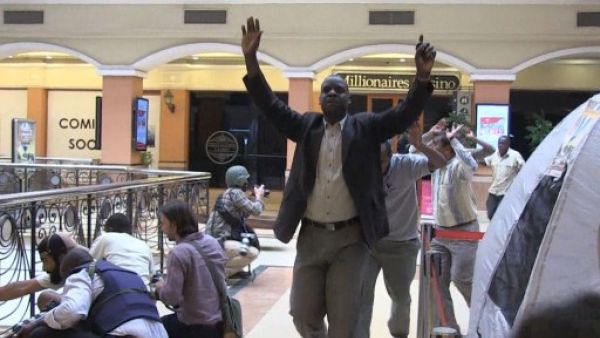Over the weekend, as Nairobi fell pray to an attack and sustained siege -- already entering its third day-- on an upmarket shopping mall, people watched as another spectacle of international terror played out. With Somalia's Al Qaeda-linked Shebab rebels quick to tweet responsibility, citing their act as inspired by Kenyan military operations in Somalia, most saw the case as a closed book. Following reports that Israeli security forces were not far from the scene during the rescue operation, it begs another look.
Extra clues mounting in the horror pointed to a new discriminatory dimension in the standards of Qaeda terror tactics. Previous Al Qaeda style international terror has often seen the militants kill swathes of their own religion in their proclaimed efforts to inflict damage on the infidel enemy. Even the most deadly terror attacks perpetrated in the name of Islam were not always able to discriminate -- 'all Muslims stand-up style' -- or clear the slaughterhouse from Muslims. The 2001 9/11 attacks, the 2002 Bali bombings and London’s 7/7 blasts are examples of Qaeda terror attacks where innocent Muslims died and were injured alongside other innocents.
At the Westfield shopping complex, every religious shopper’s worst nightmare may have been realized as non-Muslims were singled out for execution. Eye witness accounts reveal that some bystanders were asked to name the Prophet (PBUH)’s mother (Amina) - - just one trap used to isolate the wheat from the chaff. The mall in which the horror took its toll is publicly known to be Israeli-owned, hosting several national outlets - perhaps the scene for the attack wasn’t left to chance either, given the shopping Mecca’s Zionist hallmarked ownership.
Now the culling for killing along religious lines brings to mind the Olympic Munich massacre of 1972, where members of Israel’s national team were rounded up – taken hostage and killed in similar fashion to the hostage-siege modus operandi deployed at Nairobi’s mall terror.
The innocent shoppers caught up in the cross fire of Somalia’s Shebab grievance, including the 68 victims in the rising death toll, were targeted to signal a message that Kenya’s interference in Somalia -- via government troop intervention aiding against the Shebab threat -- was not welcome. This move, in one deadly delivery, may have been a swipe at Israeli owned businesses and the governments that cater them. The Kenya-Israeli healthy commercial bond has not gone unnoticed and the prosperous relation has come at a bloody price - as recently as 2002, the country witnessed trouble in the Israeli-owned ‘Paradise’ hotel, which was targeted by militants along with a flagship airline, for their Zionist connections.
Nairobi's Westfield shopping attack would seem to suggest that the militants' choice of venue was designed to inflict damage on a lucrative hub popular with tourists and Kenya's elite set. Did the Israeli connection render this particular mall a target?
By Sunday, reports broke of an Israeli security squad storming the complex and suddenly the latent Israeli link was thrown into relief. An Israeli security source confirmed that “Israeli advisers were at the scene helping Kenya to work out how end the siege”, according to a Reuters reporter.
The conspiracy-minded may have liked to think that Israel was involved in the attack, given the Jewish state’s striking track record for attracting carnage from the Arab and Muslim world - carried out by seculars to Islamists.
It is no secret that Israel has been forthcoming in aiding Kenya’s security strategy against the threat and spectre of terror at its border with Somalia. But how else does a special relationship between the Jewish state and this East African friend resonate politically and historically?
For one thing, a part of historical Kenya (now Uganda) was submitted as an option for the Jewish homeland back in the embryonic stages of Israeli foundation. While diplomatic relations between the two countries have mostly been plain sailing, it hasn’t been without its strains under various political leaderships and notably after at an all time Yom Kippur Warlow.
With renewed ties and a burgeoning relationship, the two nations have jointly worked on matters of energy, security and trade -- culminating in this latest Israeli show of crisis support at the mall siege.
As the Kenyan-Shebab stand-off unravels into the third day and we are promised a speedy conclusion by government authorities, we notice that time and time again whenever terror rears its ugly head in the international theater, you don’t have to dig too deep before you stumble on Al Qaeda and Israel in the same frame.







